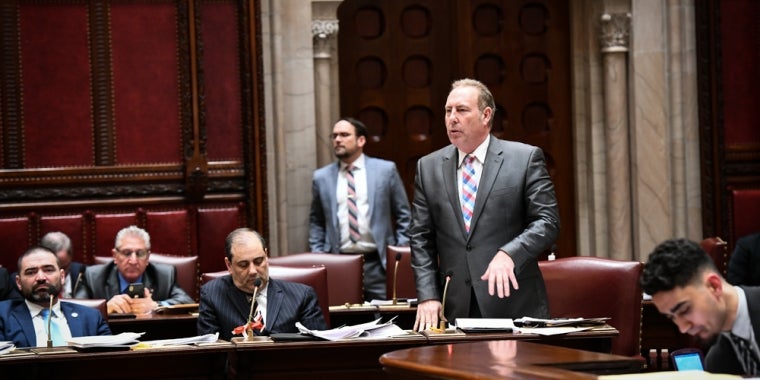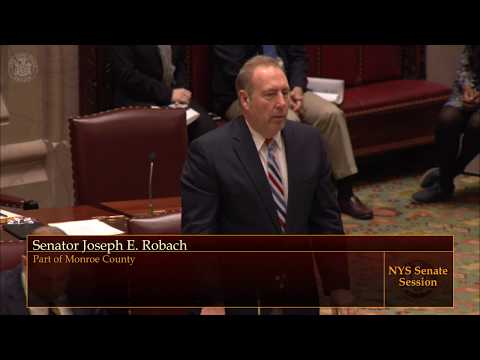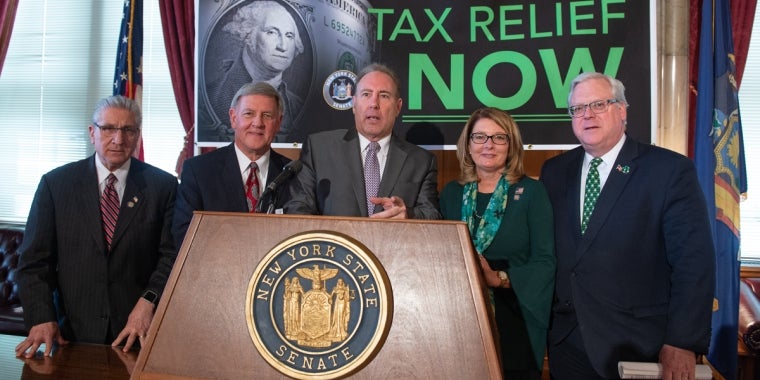
Senate Passes Job Creation & Taxpayer Protection Act
Joseph E. Robach
January 19, 2011
-
ISSUE:
- Economic Development

The New York State Senate today passed the Job Creation and Taxpayer Protection Act of 2011, a three-part plan to encourage the creation of new private sector jobs and ensure fiscal responsibility, including the enactment of a two percent state spending cap and requiring a two-thirds “super majority” vote to increase taxes.
Senator Joe Robach (R,I,C -56th Senate District) said, “Job creation across New York should be one of our biggest priorities. The taxes and fees that were imposed as a result of last year’s budget, which I opposed, are making it very difficult for businesses to operate and grow jobs in our community.”
The Job Creation and Taxpayer Protection Act of 2011 includes the following measures:
INCENTIVES TO CREATE NEW JOBS
The plan would provide businesses with a three-year tax credit of up to $5,000 for each new job created. In addition, the plan would eliminate taxes for small businesses and manufacturers that pay the state’s corporate franchise tax and roll back the income tax surcharge placed on them in 2009. It also places a moratorium on new taxes, fees and regulations.
That credit could grow by as much as an additional $3,000 per job if new hires are taken from the ranks of the unemployed who are collecting unemployment insurance from the State. Such an incentive would help reduce unemployment and the costs borne by taxpayers.
Twenty-four states have a job creation tax credit. The temporary job creation tax credit created with bipartisan support by the federal government last year, expired December 31st. However, legislation has already been introduced in Congress to renew it.
The recently expired federal legislation provided the tax credit if an employer hired a new worker off unemployment. That restriction is not part of the Senate Republican’s plan, but an additional tax credit would be provided to employers if they hire someone off unemployment.
Should the same federal tax credit incentive be renewed, when combined, the two plans would save employers thousands of dollars for each job they create. Under the Senate Republican proposal, if a business creates a new job with a salary of $35,000, it would receive a $1,487 tax credit. If the business hires someone off unemployment, it would receive an additional $3,000 credit.
The federal plan would provide that same business a tax credit of $2,170 and an additional $1,000 if the employee is retained for a year.
The proposal applies only to new jobs and employees that don’t currently provide New York with any payroll revenue.
The plan also places a moratorium on any new business taxes and fees and eliminates the corporate franchise tax for hundreds of small businesses and manufacturers with 50 or fewer employees and less than $2 million in net income. It also accelerates the phase-out of the PIT increase on small businesses that are scheduled to expire at the end of this year.
The jobs initiative would also prohibit the State from enacting any new regulations on New York companies, and create a new Berger-style commission that would have the power to eliminate regulations which are currently hindering businesses.
STATE SPENDING CAP
This will be the third time that Senate Republicans have voted to pass a state spending cap that ensures New York spends no more than taxpayers can afford. The cap, which would be set at 2 percent or 120 percent of the CPI (currently 1.9 percent), whichever is lower, would ensure that the state reduces spending and lives within its budget, easing the burden on taxpayers.
If the state spending cap was in place now the state would be forced to reduce projected spending next year by $9 billion, forcing the budget gap to be solved without raising taxes. Had the state spending cap been in place for the past 10 years the state would be spending $30 billion less next year.
According to a report by the National Conference of State Legislatures, thirty states have put in place statutory or constitutional tax or spending limits.
SUPERMAJORITY VOTE TO RAISE TAXES
In the last two years, the Legislature raised taxes by $14 billion. In the Senate, it would have taken only one vote to stop these tax hikes that devastated families and businesses. This constitutional amendment would require a two-thirds “super majority” vote in each house, rather than a simple majority, to make it much more difficult to raise state taxes. Sixteen states currently require more than a majority vote to increase taxes.
Business groups were quick to weigh in with praise for the Senate Republican plan.
Mike Elmendorf, New York State Director of the National Federation of Independent Business (NFIB), New York and the nation's leading small business advocacy organization said: "Small business understands that in order to restore and grow our economy, New York's destructively oppressive tax burden and cost of doing business must be reduced. The package of common sense reforms being advanced today by the Senate Majority is an important step in that direction and includes policies NFIB has strongly supported, such as a spending cap and requiring a super-majority vote to increase taxes and fees. We commend the Senate Majority for continuing to stand with job creators and look forward to working toward enactment of these important pieces of legislation to make our state more affordable and our economy more viable.”
Unshackle Upstate Executive Director Brian Backstrom said: "The introduction of the Senate Majority's plan to promote job growth, cut burdensome taxes and stop unnecessary regulations on New York's struggling business community is a first step to reviving our state's economy. Today's announcement sends a clear message that the members of the Senate Majority are committed to fulfilling their campaign promises of lowering taxes and fostering private sector job development. But we need both houses and both parties to do what is right for struggling New York businesses. It’s time to pass these bills."
(pictured with Senator Robach above is Senator Patricia Ritchie, 48th District)



